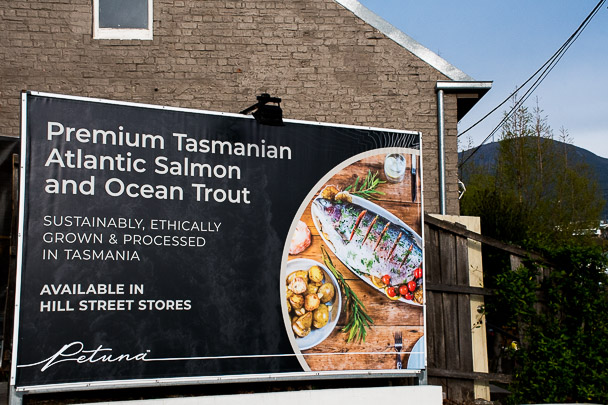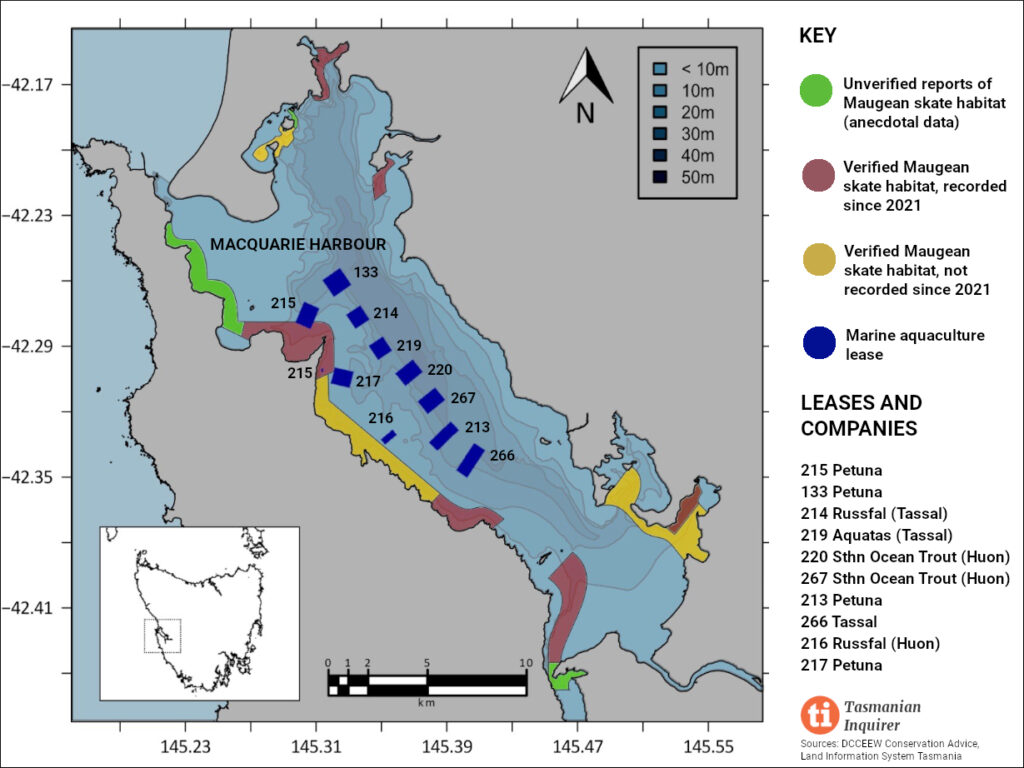Hill Street Grocer under pressure over Macquarie Harbour fish farm threat to endangered Maugean skate

A leading Tasmanian fine food retail business is facing calls to stop selling salmon and ocean trout produced in Macquarie Harbour after scientific advice warned fish farming is a leading factor driving the critically endangered Maugean skate to extinction.
Conservationists have urged Hill Street Grocers to end its relationship with Petuna, an aquaculture company that operates four of the 10 fish farming leases in Macquarie Harbour on Tasmania’s west coast.
Hill Street shops recently featured large billboards that said Petuna’s Atlantic salmon and ocean trout were “sustainably, ethically grown & processed in Tasmania” and “available in Hill Street stores”.
Kelly Roebuck, a representative of SeaChoice, a non-profit group promoting consumer awareness about seafood sustainability said it was “greenwashing at its worst”.
“Consumers would not expect a ‘sustainably, ethically grown’ product to be harming an endangered species. These environmental claims are particularly misleading for any salmon and trout products sourced from Petuna’s Macquarie Harbour farms,” Roebuck said.
Hill Street did not respond when asked about the Petuna billboards, including whether it had approved the wording of the advertisement. The billboards were changed a few days later.
Hill Street’s 10 boutique food stores across the state have sold Petuna products in its fresh fish section since October 2021.
The role of the salmon industry in the plight of the Maugean skate has been under renewed focus since scientists warned in May that the ancient species, which has survived since the time of the dinosaurs, could be one extreme weather event from extinction. The skate is found only in Macquarie Harbour and its population is estimated to have almost halved between 2014 and 2021.
The Australian government’s Threatened Species Scientific Committee advised the state and federal governments in September that it was an urgent priority before summer to “eliminate or significantly reduce” the impact of fish farms on dissolved oxygen levels. “The fastest and simplest way to achieve this is by significantly reducing fish biomass and feeding rates”, the committee said.

Several of Petuna’s leases adjoin or overlap areas near Liberty Point and Table Head that scientists have identified as Maugean skate habitat.
Roebuck said: “No supermarket should be stocking a product that is contributing to the potential extinction of a species.”
SeaChoice is part of a global coalition of environmental groups that has called on major supermarket chains Coles, Woolworths and ALDI to stop stocking Tasmanian salmon.
Salmon from Macquarie Harbour is particularly contentious. The RSPCA signed a commercial endorsement deal with Huon Aquaculture for its salmon products in July 2018, but refused to extend its support to fish from the company’s three leases in Macquarie Harbour due to concerns about the environmental impact.
Nish Humphreys, a campaigner at the global consumer group Ekō, said the fish farming industry needed to get out of Macquarie Harbour for the skate to survive. “Consumers can’t tell which products are tied to extinction, but the supermarkets can,” she said. “Woolworths, Coles and ALDI can come to the skate’s rescue by ceasing all sales of salmon and trout sourced from Macquarie Harbour”.
Salmon Tasmania, the lobby group representing the state’s three fish farming companies, recently responded to the increased pressure to deal with low oxygen levels by announcing up to $6 million in funding for a two-year trial of injecting oxygen into the water at the bottom of the harbour in a bid to reduce the impact on the skate.
“Place that kind of activity in an environment as sensitive as Macquarie Harbour? It’s totally irresponsible,” Jessica Coughlan, Neighbours of Fish Farms.
Petuna would be the worst affected company if the federal or state government required the destocking of fish farming leases in Macquarie Harbour, as it has only one lease elsewhere. The company, which is a subsidiary of Sealord, a major New Zealand fishing company, has lobbied the state government to accelerate approval of a new lease southeast of Clifton Beach, near Hobart.
Sealord’s chief executive, Doug Paulin, told a recent media conference held with Premier Jeremy Rockliff that Petuna had written to the state and federal governments to raise its concerns and address issues related to the Maugean skate. Speaking afterwards, Paulin agreed to release copies of Petuna’s letters to the governments to Tasmanian Inquirer. Subsequent requests to the company for the records drew no response.
Petuna’s use of seal ‘crackers’
The fish farm boom in Macquarie Harbour over the past decade has had the knock-on effect of attracting seals. To temporarily scare seals away from its fish pens, Petuna uses underwater explosives that are referred to by the industry as seal ‘crackers’.
Recent data from the Tasmanian Department of Natural Resources and Environment (DNRE) revealed that Petuna used 457 underwater explosives against seals in Macquarie Harbour last financial year. Tassal, the other company that deploys explosive devices in the harbour, used 58 across its three leases.
Little is known about the impact of seal “crackers” on the skate. The department said the crackers were used in surface waters and not considered a “high threat” to the skate, which primarily lives between 7 and 12 metres below the surface.
But Jessica Coughlan, a spokesperson for Neighbours of Fish Farms, said US studies had found seal crackers were designed to sink up to 4 metres before exploding and had a peak sound pressure level of around 234 decibels. “Place that kind of activity in an environment as sensitive as Macquarie Harbour? It’s totally irresponsible,” she said.
Hill Street did not respond to questions about whether the use of underwater explosives against seals was consistent with Petuna’s statement that its fish were “ethically grown”.
The threatened species committee said the extent of seal predation on the Maugean skate was unknown and recommended further research. A spokesperson for the Tasmanian Department of Natural Resources and Environment said the dark water conditions in the harbour “do not favour seals as visual predators and may impede seals’ ability to prey on skate at this location”.
 @BobBurtonoz
@BobBurtonoz